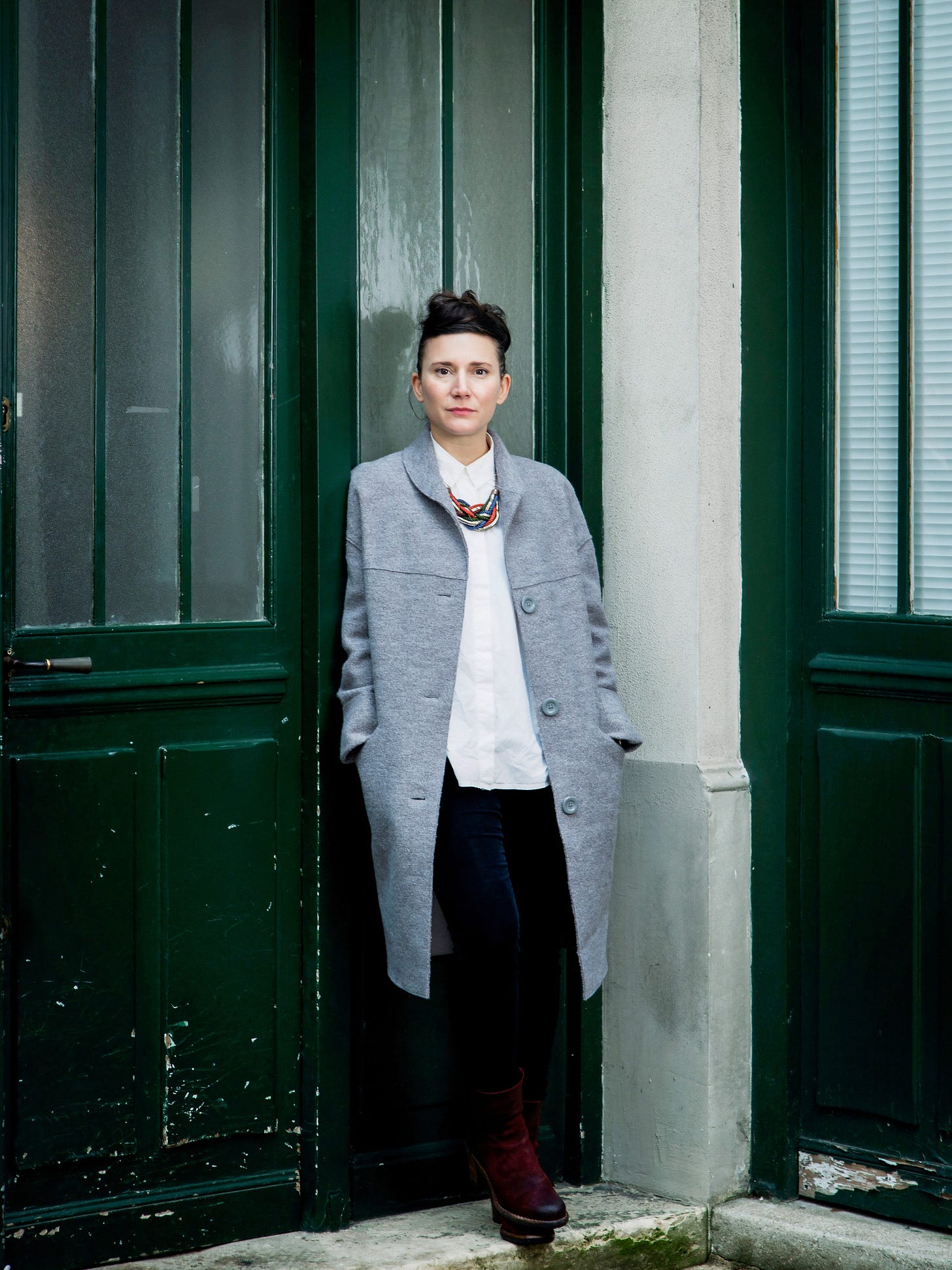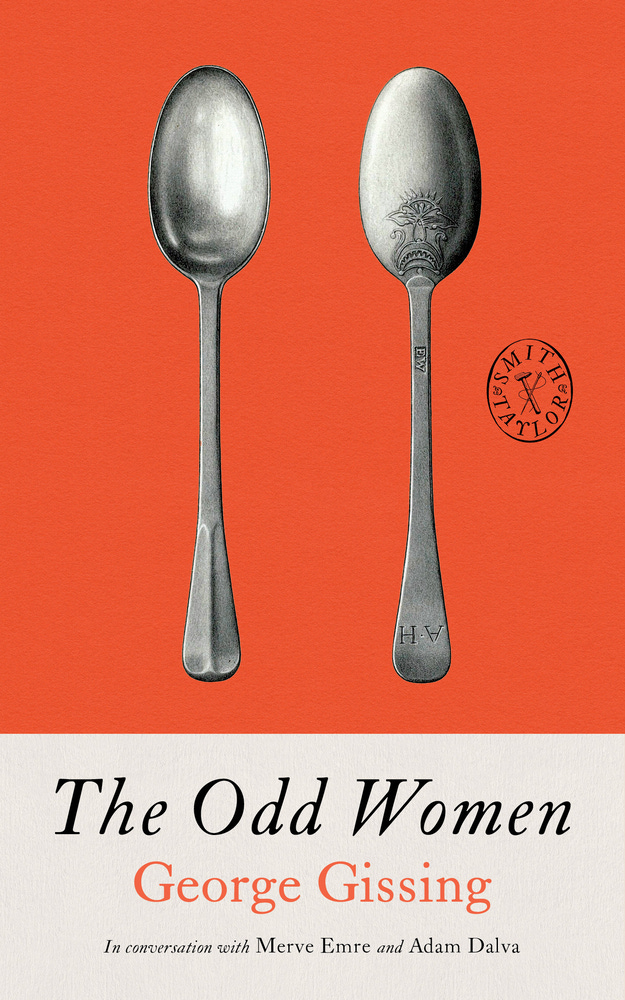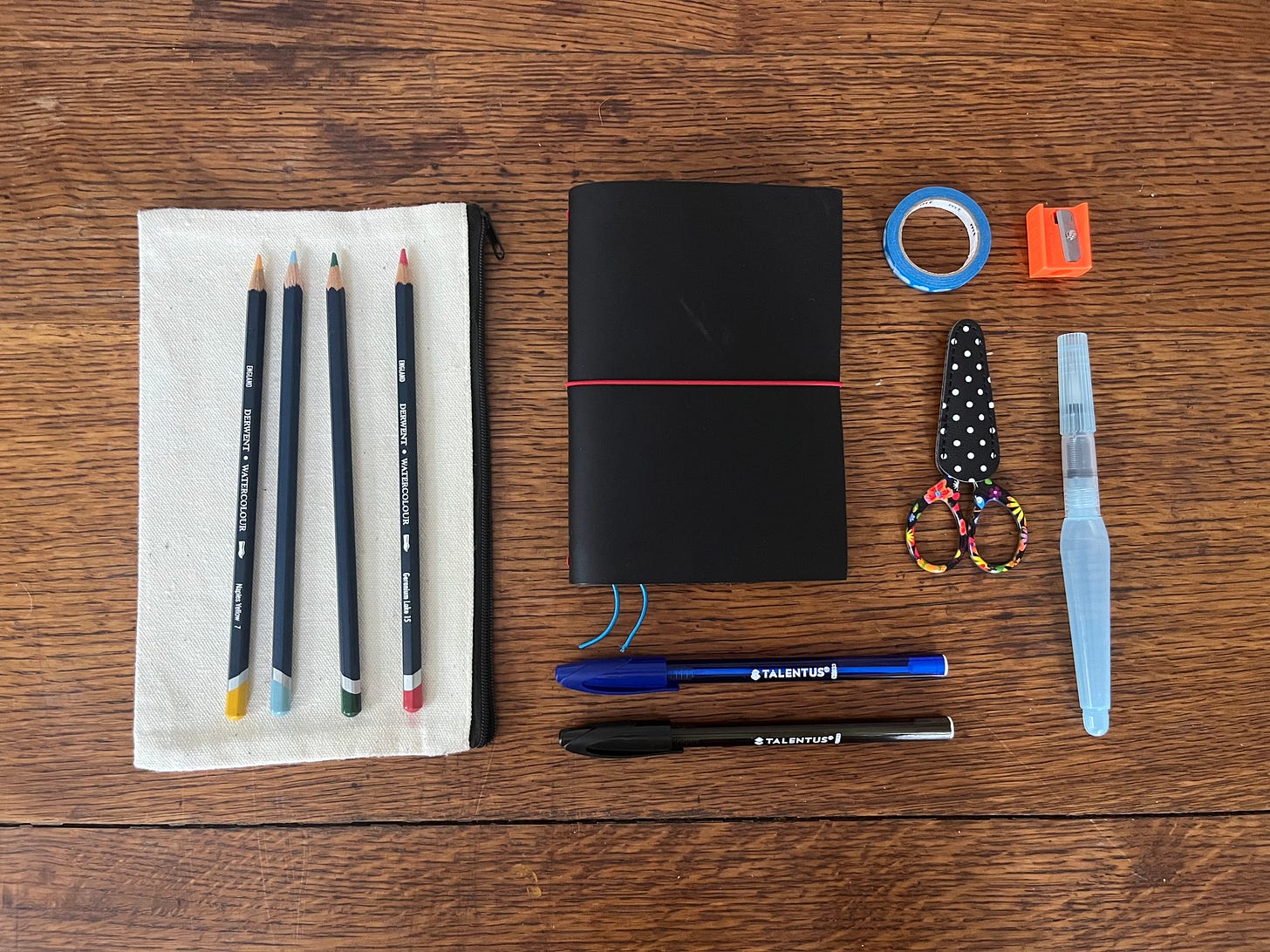Issue 128: Everything I Read in June
Seeking attention, finding self
Interviewer: Did what you wanted to write come easily to you from the start?
James Baldwin: I had to be released from a terrible shyness — an illusion that i could hide anything from anybody.— The Paris Review, 1984
I often joke that an alternative title for this newsletter could be Let Me Overthink About This. Or that if we ever held a live community gathering, it would be called Overthinkers Anonymous. At this point, I’ve made the joke so many times that I’m not even sure it’s funny anymore — just accurate. So — no surprise — I’m most drawn to what I call think-y woman books: books by or about women who are introspective, resistant and gloriously uninterested in being easily understood. These are narratives that wrestle with subjectivity, autonomy, rebellion. Not from a place of tidy empowerment, but from within the murk of actual life — the contradictions, the inner monologues, the slow churn of becoming.
Last month, I was reading Attention Seeking by Adam Phillips and trying, in real time, to untangle my anxiety about being a model reader. You know the one — always finishing what she starts, choosing the right books, performing the appropriate level of engagement. What I love about Phillips’ work is that he will dissect your condition meticulously so you feel he truly GETS YOU — I see your need, your need is valid, it’s in fact a sign of your sociability to want to connect in a certain way — and yet… in the end he just wants to convince you to lighten the fuck up. As a result last month I tried to read more freely, to follow curiosity instead of obligation. To simply let books find me.
But when I sat down to reflect on what I read, I had to laugh. Aside from the one “therapy” book, everything else I picked up — supposedly at random — turned out to be exactly the kind of reading that feels like home. I found myself deep in the minds of women who are constantly circling themselves: self-aware, self-questioning, forever trying to narrate their way into coherence. Women who read and write not to arrive at clarity, but to live inside the questions. I felt like a roomba plugging back into my charging station. It was an insanely hectic month at work and at home but reading wise… I was myself
Books mentioned:
The Odd Woman and the City - Vivian Gornick
Checkout 19 - Claire-Louise Bennett
My Brilliant Friend - Elena Ferrante
Happening - Annie Ernaux
Attention Seeking - Adam Phillips
Note: I always share the books in the order I complete them. I am very much a mood reader and I think sharing this way also gives you some indication for how one book leads into or influences what I read next.
📚 The Odd Woman and the City — Vivian Gornick
Vivian Gornick’s memoir The Odd Woman and the City is a vivid, spunky portrait of urban life and female solitude. Structured as a series of vignettes, the book follows Gornick as she walks through New York City, conversing with her longtime friend Leonard, a cranky gay man with whom she shares a sharp, ongoing dialogue about love, politics, and disappointment. Gornick interweaves personal recollections — of her parents, lovers, mentors — with literary commentary and cultural critique, particularly focused on what it means to be an “odd woman” in a society structured around coupledom. It is a fascinating exploration of what it feels like to be the type of brainy woman who chooses herself and her work and intentionally divests from romantic relationships… while also suffering some of the sadness and loneliness of those choices.
The title references George Gissing’s novel The Odd Women that I am now really interested in reading. Gornick’s prose is clear and unsentimental as she dissects herself with the same rigor she applies to the world. This is a book for lovers of city life, of intense friendship, of thinking out loud… and, in a really strange way, the narrator’s voice reminded me of Carrie Bradshaw if she’d had more substance. I really liked this one but I must admit that I’d never read any other writing by Gornick so I suspect I would have appreciated it even more had that not been the case.
📚 Checkout 19 — Claire-Louise Bennett
Checkout 19 is a deeply interior, partly autofictional novel by one of the most unusual writers I have ever read. The book charts the evolution of a woman’s reading life and writing identity from girlhood to adulthood. The unnamed narrator recalls her working-class upbringing in England, her eccentric teachers, odd jobs, weird situationships and especially the books that shaped her — often more profoundly than the people around her.
Structured in fragmented, looping reflections, the novel blends the real with the imagined — showing how one’s reading life informs and shapes their writing which then loops into their life-life — dissolving boundaries between reader, writer and text. Bennett foregrounds the experience of inhabiting a female mind: sensitive, searching and fiercely literate. Literary references — from Nietzsche to Angela Carter — intermingle with invented stories and meditations on everything from domesticity to death. If you are the type of reader who loves to leave a book with a reading list, this one will absolutely make you lose your mind. I started a list but the list grew so long, I gave up on writing it. I decided that once I am finished, I will just keep the book close to my desk and use it as a reference on what to read whenever I run out of ideas.

Anybody who has read Bennett will tell you that this work, like all her works, resists traditional plot, opting instead for a fluid, lyrical exploration of consciousness. It’s elliptical and immersive, offering readers a glimpse into how stories and language embed themselves into our very sense of self. Bennett’s style is both dense and yet intimate, funny yet devastating. I always say about Bennett that she will most definitely NOT be everyone’s cup of tea but my hope is that you try reading her because if you love her, you will be OBSESSED. Read 10 pages and you will know.
📚 My Brilliant Friend — Elena Ferrante
I know, I know. Let me explain. I first picked up My Brilliant Friend — the first book in the Neapolitan Quartet — during the first week of the pandemic. I gave up about 60 pages in. I think I was too anxious to read anything immersive at the time, and this novel — with its dense universe, endless cast of characters and so much drama — felt overwhelming. I remember reading it in my head with a fake Italian accent and just stressing myself out. But it’s such a modern classic, I always knew I’d return to it.
The book introduces us to two friends — Lenù and Lila — and follows them from childhood through adolescence as their lives become deeply entangled in both fierce loyalty and bitter rivalry. Each girl is trying to define herself against a backdrop of family pressure, gender expectations and economic hardship in postwar Naples. Lila is brilliant, beautiful, and volatile; Elena is diligent, thoughtful, and eager to please. Their friendship is a study in contrast — and a crucible of mutual admiration and envy.
Ferrante depicts the social microclimate of their neighborhood with forensic precision, revealing how violence, patriarchy and class quietly but powerfully shape the girls’ fates. The psychological turmoil is intense, especially in its portrayal of how female identity is formed — and fractured — within friendship. I read it as a story about the need to both love and outgrow the people who shape you most. Parts of the book dragged for me and some of it triggered memories of toxic childhood friendships I’d rather forget. But my friend Rosie swears it’s all worth it just to get to the second book, The Story of a New Name. LOL. OK. I’ll bite.
For anyone like me who has been meaning to read this series but somehow not gotten around to it yet, my friend just announced My Brilliant Ferrante — a community reading and reflection series for Women In Translation Month, which is in August. You can read more about the project on her substack, I think it will be so much fun. In addition to keeping on with the series, I was already planning to read Days of Abandonment with my IRL bookclub so the timing is just perfect for me.
📚 Happening — Annie Ernaux
In January I read my first Ernaux — A Simple Passion -– and really liked it. ’s recent post about how Ernaux got her out of a reading slump reminded me that I have been meaning to read more of her. In Happening, Ernaux (who, in case you need reminding is a fucking Nobel laureate) recounts her harrowing experience of undergoing an illegal abortion in 1960s France.
The memoir, written with Ernaux’s signature matter-of-fact-ness and detachment, begins with the discovery of an old diary entry and spirals into a meditation on time, shame, and the body. At 23, Ernaux was a promising university student with no legal or safe options for terminating her pregnancy. What follows is a chronicle of desperation: searching for someone to perform the abortion, enduring the procedure and recovering in silence, isolated by fear and stigma. Ernaux does not sensationalize; instead, she lays bare the physical and psychological realities of her ordeal, refusing euphemism or self-pity. The result is a searing indictment of the systems that punish women for their sexuality and choices.
Though it recounts a personal story from the past, Happening is achingly relevant and I especially appreciated reading Ernaux’s reflection on how important it is to write about our experiences with taboo topics:
I realize this account may exasperate or repel some readers; it may also be branded as distasteful. I believe that any experience, whatever its nature, has the inalienable right to be chronicled. There is no such thing as a lesser truth. Moreover, if I failed to go through with this undertaking, I would be guilty of silencing the lives of women and condoning a world governed by male supremacy.
More so than I did while reading her novel, I felt a strong connection and solidarity with Ernaux — around being a woman living under a patriarchal system and also allowing myself to write my bodily experience into existence; hoping that somehow through the act of making my thoughts become writing, I am maybe offering something intelligible and universal for others to connect to. I don’t know if I can call myself an Ernaux fan after having read only two of her books but I can definitely say that I want MORE of her. For anyone who’s Ernaux-curious, Celine’s guide on what to read in what order is a great place to start.
📚 Attention Seeking — Adam Phillips
I trace the origins of my somewhat belated but exuberant interest in psychoanalysis to reading Lauren Elkin’s Scaffolding last summer, which sparked a rabbit hole of obsessive Googling about Lacanian theory. That interest only deepened with my reading of Deborah Levy, whose work I find deeply philosophical despite its superlight, elliptical touch. Earlier this year, I stumbled upon the writing of British psychoanalyst Adam Phillips. His book On Giving Up felt like a balm — it gave language to some of the grief and confusion I’ve been carrying from my twenties, particularly around the trauma of leaving academia. (If you’ve been reading this newsletter for a while, you may remember the essay I wrote about dropping out of grad school, and how difficult it was to step away from an identity I’d clung to — the bookish one, the girl with the tote bag and the annotated syllabus.) This past month, I returned to Phillips and read Attention Seeking, which I found similarly liberating.
In this slim, provocative collection of essays, Phillips explores the paradoxes of attention — how we seek it, offer it, resent it and are shaped by it. He argues that attention is not merely about focus, but about desire and that the longing to be noticed is central to how we form our sense of self. Drawing on clinical observations, literature and cultural criticism, he examines how attention-seeking is pathologized, particularly as we grow up, and how this judgment often obscures its deeper purpose: to be recognized, to be known, to feel like we matter. As I’ve come to expect from Phillips, the writing is literary, precise and subversively funny. He challenges the moral hierarchies we attach to certain behaviors, repositioning attention not as vanity or indulgence but as a vital form of communication. His prose is spare but richly aphoristic—built not for self-help, but for mature and honest introspection.
For me, Attention Seeking felt very timely. I’ve been thinking a lot about the line between reading as a private joy and reading as an identity — a public, curated selfhood. As someone who’s built a creative life around books, I’m aware of how easily genuine passion can turn into performance. But for that Phillips doesn’t offer solutions so much as invitations: to pay attention to what we attend to and to get curious about why certain needs feel so urgent. What would it mean to take our desire to be seen — by others, by ourselves — seriously? Attention Seeking doesn’t try to resolve that tension, but it gives it shape. And for me that shape felt like permission — to allow my attention to go wherever it needs to go and know that it will probably go there for a reason.
As someone who spends a lot of time publicly sharing what I’m paying attention to—and quietly worrying about what that attention reveals—I brush up against shame often. Shame that I’m not reading enough, or the right things. Shame about what I underline, what I love. Phillips defines shame as the distance between who we are and who we hope to be. And painful as that distance can be, he suggests it also points us to what is “most valuable and most alive” in our lives.
If reading Phillips helped me understand that idea intellectually, reading Gornick, Bennett, Ferrante and Ernaux made me feel it somatically. These women don’t just reflect on their lives — they metabolize them. They model what it looks like to hold your contradictions close, to live in process and to treat attention not as a way of proving something, but as a way of honoring oneself.
❤️ Favorite books of 2025:
January - Pond by Claire-Louise Bennett
February - Open Throat by Henry Hoke
March - Swimming Home by Deborah Levy
April - Assembly by Natasha Brown
May - The Wilderness by Ayşegül Savaş
June - Checkout 19 by Claire-Louise Bennett
There will be no newsletter next week. I planned to pre-schedule a post but decided to allow myself to just be human and give myself a break. I will be back on the 17th with a travel reading update and — inspired by — hope to share some travel journal spreads. , , and helped me put together the best travel journaling kit.
Everybody, stay cool! And, America — happy birthday. I love you but this year you get no cake.
🤓 To wrap up, I have some questions for you:
Are there other CLB superfans in our midst?
Who plans to read Ferrante with Kolina and Co in August?
What's the last book that made you feel like a roomba returning to the charging station?












For anyone left unconvinced, I read My Brilliant Friend in May and thought it’s the best book I’ve ever read. I have the next one, The Story of a New Name, lined up to read soon but I’m nervous. The books are so dense and immersive, I don’t know if I’m ready for it.
I've been meaning to read Checkout 19, which has been languishing on my unread shelf. This may be the prod I needed! And I love Ferrante's Neopolitan series immensely -- the first book really is the foundational text needed for the rest of the series, which I found page-turning (particularly book 2), and couldn't put down. Looking forward to how you find the rest of them and the story of Lila & Lenu; the HBO series is phenomenal if not as internal due to the medium. (Obviously the tv series doesn't hold a candle to the books, but it's beautifully filmed.)